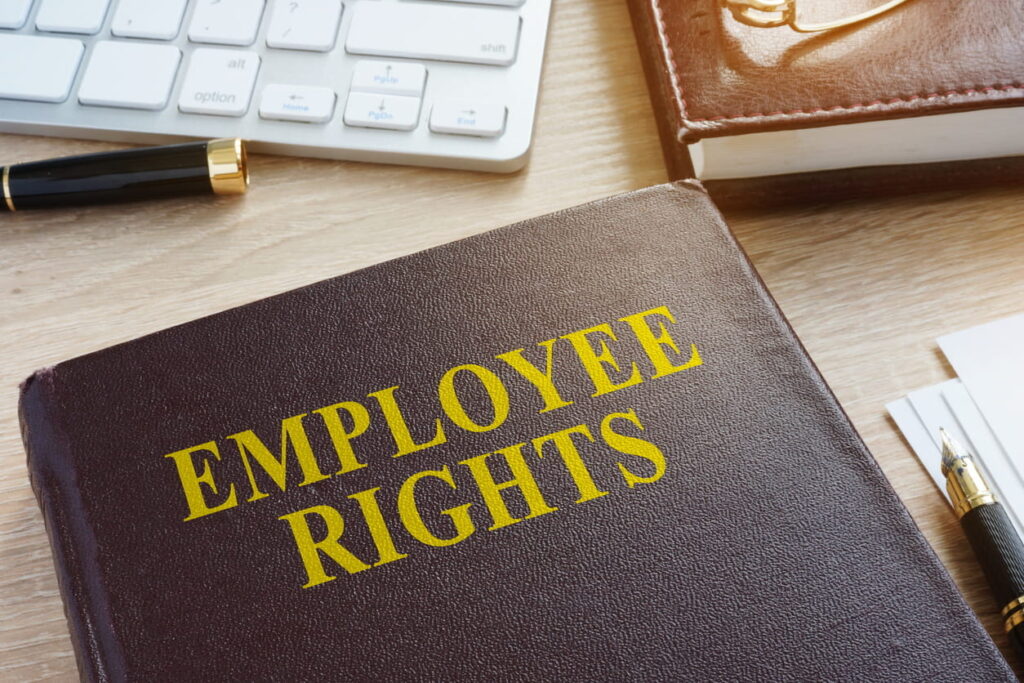15 COLORADO EMPLOYEE RIGHTS YOU NEED TO KNOW

As an employee in Colorado, it is essential to understand your rights and what to do should your employer violate those rights. You could have grounds to pursue legal action against them with assistance from an experienced employment law lawyer.
What are employee rights?
Employee rights are a worker’s legal and ethical entitlements concerning their employer. They may include:
- The right to fair wages
- Reasonable working hours
- A safe work environment
- A work environment without discrimination or harassment
- Payment for overtime hours
- Sick leave
- Health insurance benefits
- Pensions and retirement plans
Employees also usually have the right to join labor unions or employee organizations related to their specific job duties and personal interests.
Please keep in mind certain benefits offered by an employer can vary based on the size of the business as well as state and federal requirements. In addition, employers are not required to provide vacation time, time off for holidays, or bereavement leave if there is no established company policy.
Why are employee rights important?
Colorado employee rights are important because they provide employees with fair working conditions and protect them from unfair discrimination, unequal pay, and dangerous work environments.
Employees’ rights also extend to their relationships with their coworkers and managers, ensuring that no one is treated unfairly due to various factors such as race, gender, or religion. Protecting these fundamental human rights in the workplace helps ensure fairness between employers and employees, leading to greater job satisfaction and productivity.
15 Colorado employee rights
1. Freedom from discrimination
In Colorado, you have the right to do your job free from discrimination. The Colorado Job Protection and Civil Rights Act of 2013 provides strong, sweeping protections for employees from discrimination based on gender, race, age, sexual orientation, religion, disability, or marital status.
In addition, an employer must make reasonable accommodations for a pregnant or breastfeeding employee. Discrimination in the workplace occurs when you’re treated differently because of a protected status.
2. Whistleblower protection
If you suspect someone is committing a crime at work, you have the right to report it. You can report suspected illegal activity without fear of retaliation. When you report a crime, you’re called a whistleblower. Your employer may not wrongfully terminate you or penalize you for taking the step to report what you believe might be criminal activity.
3. Workers’ compensation
Workers’ compensation is the term for an employee’s rights in Colorado due to injury as a result of their job duties. Your employer must pay for your medical bills and medical treatment if you get hurt on the job. Workers’ compensation covers any type of injury that occurs at work or because of work, including immediate and chronic injuries. You also deserve financial compensation if you cannot work because of your injuries.
4. The right to discuss your wage
Does your employer pressure you not to discuss your wages with coworkers? Have they asked you to sign a confidentiality agreement not to discuss what you get paid with others? In the State of Colorado, your employee rights include the right to talk about what you get paid. You can talk about pay as much as you want to. Employers can’t penalize their employees for discussing wage and pay information.
5. Minimum wage and overtime
As of January 1, 2023, the Colorado minimum wage is $13.65 per hour. The tipped employee minimum wage is $10.63 per hour. However, if you work in Denver, the city’s minimum wage is $17.29 per hour, and $14.27 per hour for tipped employees.
In addition to minimum wage, you have a right to overtime pay if you work more than forty hours per week or more than twelve hours in a day. The overtime pay rate is 1.5 times your base regular hourly pay for any overtime hours.
6. Full-time and part-time work
In Colorado, full-time work is usually between 30-40 hours. Part-time work is typically considered anything less than 30 hours a week. However, the definition of full-time work can vary with individual employers.
7. OSHA compliance
The Occupational Safety and Health Administration (OSHA) is a federal organization that creates safety standards for workers. OSHA guidelines apply to a wide variety of occupations and many different safety issues. All of the rules work to keep employees safe at their place of employment. If your employer isn’t following OSHA standards, you have the right to insist on enforcement without retaliation from your employer.
8. Leave as required by law
You have the right to take leave from your job for a qualifying reason. Things like the Family Medical Leave Act (FMLA), State Family Medical Leave, jury duty, and other situations give you the right to take unpaid leave from your job. As long as you meet all of the qualifications, you may take time off from your job without pay and without a penalty. Colorado employers must comply with all reasons for leave that state and federal law requires.
9. Health care coverage for 18 months
When you separate from a Colorado employer, you have the right to continue your health insurance for up to 18 months through COBRA (Consolidated Omnibus Budget Reconciliation Act). It’s up to you whether you want to continue your health insurance at all or for any period up to 18 months.
In addition to termination of employment, an employee’s death is a qualifying event that provides others with coverage and the right to continue the health insurance plan.
10. A smoke-free workplace
Colorado employers may not require you to work in a smoking environment. You have the right to work in Colorado in a smoke-free workplace. In addition to prohibiting smoking in the workplace, there are restrictions on how far from the entrance to the building people have to be to smoke.
11. Access to your personnel file
Your Colorado employee rights include the right to view your employment files. Colorado work laws state that you may look at your personnel file for discipline records, eligibility for advancement, and any other purpose.
12. Rest and meal periods
Employees are entitled to a ten-minute rest period (break) for every four hours of work. Employees are also entitled to a meal break of at least thirty minutes (unpaid) when they work more than five consecutive hours.
However, when the nature of their work makes it impossible to take an uninterrupted meal break, the employer is required to allow the employee to consume their meal while continuing to work. The employer must also compensate the employee because they continued to work.
13. Employment at-will
All Colorado employees are presumed to be at-will, meaning either the employer or the employee can end the employment agreement at any time for any reason. However, employers may not terminate employees due to discrimination. Employers must have reasonable causes such as poor performance or excessive absences when they terminate an employee.
14. Right to work is not mandatory
Right to work is a law that allows workers to choose to join a union in their workplace. It also makes paying dues and other membership fees optional if an employee works in a unionized workplace.
Colorado is not a right-to-work state, but its Labor Peace Act suggests that workers are not required at most workplaces to join a union or pay dues even though they may receive the same benefits and compensation as union members. However, this also means that union protections may not cover non-union employees.
15. Final paycheck
When an employee voluntarily terminates employment, the employer is required to issue their final paycheck on the next regular pay period. However, if the employer terminates the employment, all wages are due immediately, except if the accounting system is nonoperational or the payroll department is offsite.
In these cases, the employer has up to 6 hours on the next workday or up to 24 hours from the start of the next business day, respectively.
What to do if your rights have been violated?
If your rights as an employee have been violated, it is essential to take steps quickly and protect yourself. First, document the incident thoroughly and collect any evidence that may be relevant.
Keep a record of all communication related to the situation, including emails or other types of correspondence from your employer. Additionally, contact an employment law attorney to obtain legal advice and determine your next steps.
What rights do you have if you have been charged with misconduct?
You may still be entitled to certain rights if you have been charged with misconduct at work. These rights include:
- The right to an explanation of charges being made against you
- The right to respond and dispute any claims or allegations made against you
- The right to access relevant documents that support the charges
- The right to challenge decisions regarding penalties or disciplinary action taken
Our employment law attorneys are here for you

Do not hesitate to take action when you believe your employee rights have been violated. Our employment law lawyers at Bachus & Schanker are here to help you, answer your questions, determine if your rights were violated, and advise you on your next steps.
Sources:
Family Medical Leave Act (FMLA).
HB13-1136: Job Protection Civil Rights Enforcement Act 2013. (2013).






